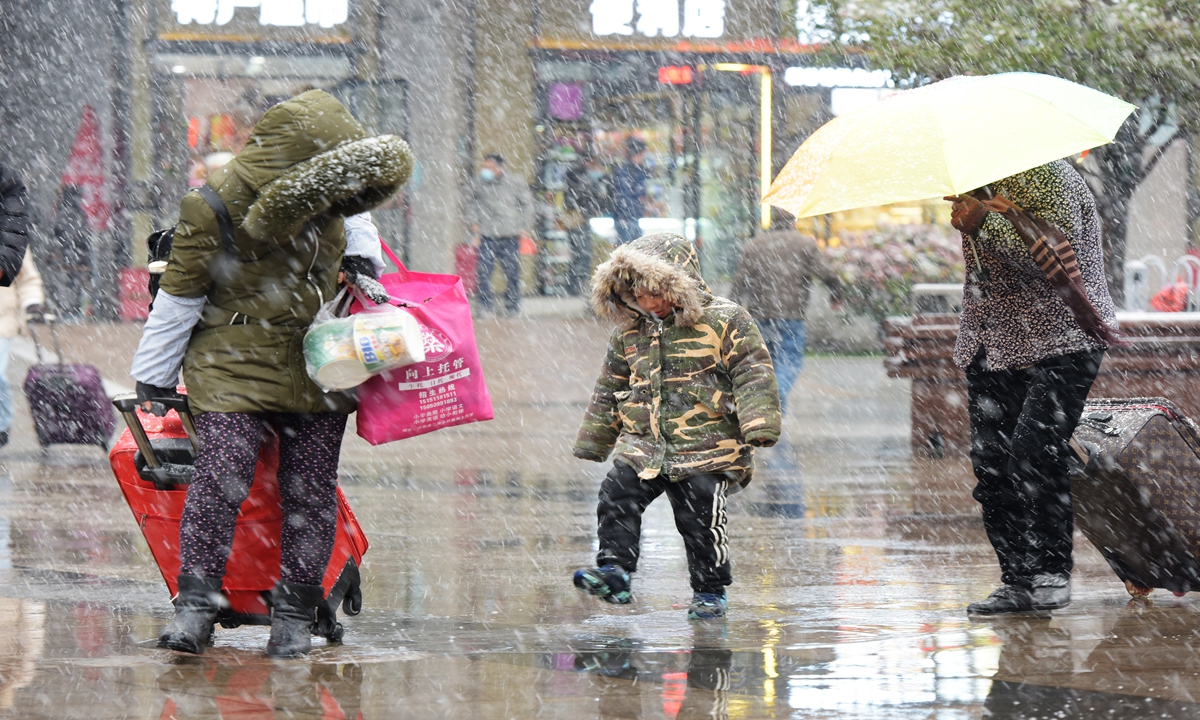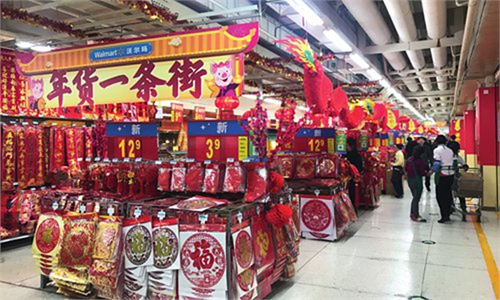
Travelers in Xuzhou, East China's Jiangsu Province walk near a train station in heavy snow on Tuesday. China is scheduled to sell train tickets for the 2021 Spring Festival travel rush on Wednesday, and is expected to see 407 million railway passenger trips during the upcoming 40 days. Photo: VCG
China's national rail operator issued a notification of ticket pre-sales for the 40-day 2021 Spring Festival travel period, known as chunyun, on Tuesday. For the Chinese people, who spent an unforgettable Spring Festival this year due to the COVID-19 outbreak, this means they are now officially entering the most important annual holiday season. This time, they are fully prepared for the upcoming Spring Festival travel rush, the world's largest migration, despite the outbreak of sporadic new cases in several cities in China.For many, what was missed in the 2020 Spring Festival could be compensated for as the country has successfully contained the virus spread, making family reunions and gathering of friends possible in 2021. There were hard lessons to be learned during one year of fighting the coronavirus, which changed the public's hygiene habit and mindset, even reshaped the Chinese people's collective memory.
Some who sacrificed their reunion happiness with their families during the 2020 Spring Festival told the Global Times on Tuesday that they won't get into the same struggling situation this year as during the early outbreak in Wuhan, Central China's Hubei Province last year, given what they had learned from China's experiences in fighting the epidemic over the year.
China is now prepared to safely deliver 407 million passenger trips during the 2021 Spring Festival travel rush from January 28 to March 8 with 10.18 million daily passenger trips, according to the national rail operator.
The upcoming chunyun starts 18 days later than the Spring Festival travel rush in 2020, which began on January 10. The overall travel rush period for 2020 recorded 440 million passenger trips with 11 million daily passenger trips.
Ahead of chunyun and days before the New Year's holiday, the Chinese Center For Disease Control and Prevention (CDC) issued some personal hygiene and public health guidelines including preventive measures against COVID-19 epidemic, travel advice, mandatory mask-wearing on public transport and social distancing requirements.
It also included examples of dos and don'ts, such as avoiding contact with live poultry and not purchasing live poultry, or advising that it is safe to buy frozen products that have been cleared for sale.
These are measures which have become familiar to many ordinary people compared to early 2020, as this difficult year was a process of learning how to deal with the unknown virus, respecting science and facts, following professional advice and keeping morale high when confronting the common crisis.
However, it's not time to relax vigilance given the recent spikes in new cases in cities like Beijing and Shenyang, Northeast China's Liaoning Province, especially when the sources of some cases are unknown, some leading Chinese epidemiologists warned.
What was learned?
"As we look back at this year's fight against the virus, I would use the word 'flaw' to describe how we have responded to the epidemic, rather than the word 'lesson,'" Wang Guangfa, a respiratory expert at Peking University First Hospital, told the Global Times on Tuesday.
Locking down Wuhan on January 23, 13 days after the 2020 Spring Festival travel rush begun, was a very swift and determined decision to make, at a time when there was scant knowledge about the virus. Even though millions had already left Wuhan for other Chinese cities prior to the lockdown, the decision prevented more people getting out of the city and helped prevent the virus from spreading more widely, Wang said.
As for the "flaw," Wang noted that as a new disease, China needed some time to know and study it. During that process, science should be respected and truth should be sought from the facts and investigations, he said.
Wang noted that as a new disease, it took time to understand and study it. During the process, science should be respected and truth should be sought from evidence and investigations, he said.
A lack of understanding about the coronavirus and an inefficient emergency-response mechanism at the early stage of the outbreak by the Wuhan and Hubei health authorities were major flaws in China's anti-epidemic experience. More importantly, individual ignorance over the infectious disease, rejection of mask-wearing during the winter, outdated dining habits in some rural areas and flawed community management also made the early prevention work much more challenging.
"Now, everyone wears masks," an employee who works at a local Wuhan hospital who preferred not to be identified told the Global Times on Tuesday. About a year ago, when the first "unknown pneumonia case" emerged in the city, the employee said she even had difficulties in persuading her parents and relatives to wear masks in public places as they thought it was unnecessary.
As the winter is also the season when colds, flus and other respiratory illnesses are prevalent, medics in Wuhan are fully prepared for the upcoming holiday season and have been advised not to leave Wuhan in case of an emergency situation, the employee noted "It's not because the situation is getting intense again [because of sporadic cases], but not to be caught off guard," she said.
The Chinese CDC also suggested that personnel from medium and high-risk areas should avoid travel during the upcoming holiday season and those from low-risk areas should not to travel to medium and high-risk areas. In Beijing where new cases have been reported, all districts, departments and companies have been required to enter a "state of emergency" to adopt a more resolute attitude and stringent measures to curb the virus spared.

China's first ISO-containerized biosafety level 2 plus mobile nucleic acid testing laboratory was officially delivered at Shanghai Pudong Airport. Photo: CFP
Remain cautious, confident
Senior experts from the Chinese CDC including its chief epidemiologist Zeng Guang, believe that after one year of accumulated experience in dealing with COVID-19, the likelihood of a repeat of the severe situation of early 2020 is low. But still, China needs to accelerate approval of the vaccination for emergency use and roll it out to cover high-risk groups as soon as possible, he told the Global Times in an earlier interview.
"For the rest of people, we need to remain highly cautious as the upcoming Spring Festival will be the most important period to fight the coronavirus while the large-scale vaccination is in sight, Zeng said.
The majority of migrant workers in major urban areas usually return home for an extended period during the Spring Festival. Many were not able to see their families in 2020, as Spring Festival was peak period for virus transmission.
However, given the latest advice from the Chinese CDC, some said they would look at the guidelines carefully before deciding to book tickets for Spring Festival, as there are risks of long-distance travel. Some said they may not return to their hometowns just in case.
However, the nation has accumulated abundant knowledge about the virus and has enacted anti-epidemic measures that coordinate with the efforts of every one, Wang said, noting "the nightmare of last Spring Festival and city lockdown won't happen again."
Wang does not believe that China will issue travel ban during Spring Festival, because as long as people maintain the current anti-epidemic measures which have proven effective over the past year, China will be safe. People can be reassured of a happy holiday, he said.
But still, the Chinese expert warned of the risks of sporadic outbreaks. "A single spark can start a prairie fire. People should be encouraged to cancel unnecessary trips and reduce the chance of getting infected."
Zhong Nanshan, China's top epidemiologist who first unveiled the human-to-human transmission risks of COVID-19 to the public during the 2020 Spring Festival, said Tuesday that there will not be a large-scale outbreak this winter, as effective and stringent prevention work has already been formed.



